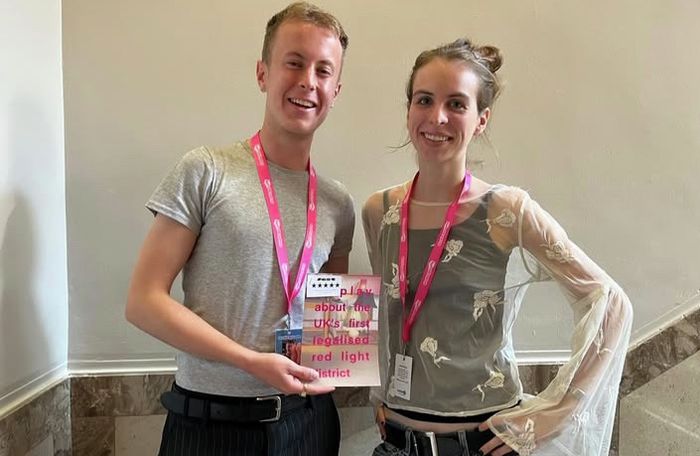The absurdist antics of Xhloe and Natasha
The famed Fringe duo sit down with Josh Pritchard to talk money, devising theatre, and what university can teach creatives

About a month before I came to Cambridge, a friend of mine took me to see an Edinburgh Fringe show that had made its way to London. A Letter to Lyndon B. Johnson, Or God: Whoever Reads This First follows two young boy scouts in the era of the eponymous president, reciting their adventures to each other until they are intruded by the harsh realities of their time. A year later, Xhloe and Natasha, the writers and stars of that play, have continued to stand out in one of the world’s most competitive theatre scenes. LBJ continued the duo’s tradition of winning a Fringe First Award for new writing: a prize they have now won three years consecutively. This past year, however, was different, performing their three Fringe shows a combined 44 times over the festival’s run. That, alongside finally making a profit.
“We want to fight for ourselves until we’re paid what we’re worth”
I open our discussion by asking them if they think they’ve made it. For the pair, that milestone, nebulous as it is, still feels distant. “We want to fight for ourselves … until we’re paid what we’re worth,” Xhloe explains. Despite the mixed financial success Edinburgh has previously brought them, the pair still appreciate the city as a home, despite only being able to sneak in two drinks during this past Fringe season, a dry spell redeemed somewhat by an impromptu chat with Amy Poehler after one of their shows. Even on a Teams call, I start to notice the rapid chemistry between the two, quickly tagging in to finish and expand upon the others’ thoughts, a bond forged since their early days of performing together in Manhattan.
Natasha mourns that: “I would’ve loved to have been a nepotism baby,” but the hard times of striving to earn a name in New York “set a tone for the grind” the pair would later endure. Not that this was done without any support; the pair credit a teacher who sneakily let them stay after school in the dance room for hours. The two met at school, and continued to work together in university, where they soon discovered the wonders of theatrical absurdism. Natasha, a “vicious defender” of Tom Stoppard’s Rosencrantz and Guildenstern Are Dead, can still recall explaining its genius to an oblivious classmate (“you don’t get it!”), before finding other inspirations such as Samuel Beckett, Nicki Sylvia, and Suzan-Lori Parks.
“If you wanna be taken seriously, shell out to make your show look professional”
It’s at this point we discuss the pair’s devising technique, which began in those initial sessions after school; the two would improvise small scenes, lines and movements together, which eventually grew into writing long-form plays. This spontaneity hasn’t disappeared: “In our writing process, we really don’t ‘endgame a play.’” In their piece, And Then The Rodeo Burned Down, this series of discovery is fictionalised, with the protagonists themselves trying to come up with an answer to the title’s mystery. To my surprise, this development came out of necessity: “we were working at the oddest hours of the night … exhausted.” That and, as the protagonists themselves allude to, the pair eventually couldn’t afford to continue the story.
Xhloe predicts that this kind of obstacle is likely to continue for Fringe artists. As the cost-of-living rises, “you’re going to see a lot more minimalism, less spectacle [and] a lot more one-person shows,” as it’s the only thing independent artists will be able to afford. While the pair are happy that tools are out there to make stagecraft more accessible, they have some advice for new shows taking place: “The one thing you should never skimp on is your marketing materials … if you want to be taken seriously, shell out to make your show look professional.” To young artists in university, Natasha advises, try and learn as much as you can, “be the sponge.” Both credit their time in university for giving them a variety of skills to help with theatre, whether through learning how to use QLab or Xhloe’s time working in a costume shop: “everything can be helpful!”
To close, I ask if there are any new projects that fans of theirs can expect in the near future. Currently, the pair plan to take their previous shows and “see what they can become without the constraints of the Fringe”. LBJ, for instance, went from 50 minutes to 75 following their first run. “We’re constantly in a creating process,” they state, but can’t wait to continue pushing forward, even though, as Natasha says: “this business is so uncertain.” One way or another, “we will never stop creating.”
 News / Right-wing billionaire Peter Thiel gives ‘antichrist’ lecture in Cambridge6 February 2026
News / Right-wing billionaire Peter Thiel gives ‘antichrist’ lecture in Cambridge6 February 2026 Features / From fresher to finalist: how have you evolved at Cambridge?10 February 2026
Features / From fresher to finalist: how have you evolved at Cambridge?10 February 2026 Film & TV / Remembering Rob Reiner 11 February 2026
Film & TV / Remembering Rob Reiner 11 February 2026 News / Churchill plans for new Archives Centre building10 February 2026
News / Churchill plans for new Archives Centre building10 February 2026 News / Epstein contacted Cambridge academics about research funding6 February 2026
News / Epstein contacted Cambridge academics about research funding6 February 2026










